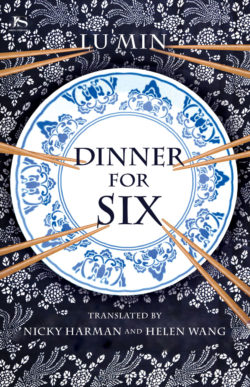Dinner for Six, by Lu Min
Publisher's Blurb
translated by Nicky Harman and Helen Wang
Balestier Press, 2022
Under the stench of factory skies, two single parents and their four teenaged children gather together for Saturday dinners. But can widowed accountant Su Qin ever publicly acknowledge her socially-mismatched relationship with Ding Bogang, a laid-off manual worker? Can she bear to see her ambitious and studious daughter form a romantic connection with his son? Can her obese son create the perfect family he craves? Will Ding Bogang’s silly married daughter ever get pregnant?
In a story about growing up and the complications of family life, two generations of lonely individuals come together against the odds, learning to love as they traverse the long and arduous journey of life.
Reading Chinese Network Reviews
Reviewed by Catherine Shipley, 25/11/23
 Before opening Dinner for Six, I read that it was about two single parents and their four teenaged children gathering for dinners together. From this I formed an expectation that it would be a heartening story, which would recount how two families can joined together to form one and live happily ever after.
Before opening Dinner for Six, I read that it was about two single parents and their four teenaged children gathering for dinners together. From this I formed an expectation that it would be a heartening story, which would recount how two families can joined together to form one and live happily ever after.
Fortunately, Dinner for Six is much more complex than that. The setting is a state-run factory zone on the outskirts of a city. It is a self-sufficient zone of residential housing, schools, shops and the ‘Crossroads’ market, which brings the otherwise divided groups of workers together. I was aware that this type of workplace used to be commonplace in China. Dinner for Six offers an insight into what life may have been like in such a set-up. The lives of the characters develop against the backdrop of a changing political and economic climate, the two being inextricably entwined. We see the factory zone through the eyes of the main characters. It is hideous, damaging, toxic and yet, paradoxically, provides community, support and security to its inhabitants. The single father of the story, Ding Bogang, looks out from his apartment at the ugliness of the factory with a tenderness one might expect him to feel towards an imperfect family member.
Su Qin, a single mother, starts a relationship with Ding Bogang. They are both widows. Their relationship appears to exist because it is practical and convenient. Su Qin is ashamed of Ding Bogang, since he has a lower social status than her own, and goes out of her way to ensure no-one knows of their liaison. Despite this, her desire for him is clear and she acts on it, risking reputational damage and the judgement of her children. Although there are surface-level differences between them, Su Qin and Ding Bogang are brought together by much deeper shared experiences; the love for their respective spouses; the never-ending grief of their loss; the common experience of living in the factory zone and raising their children alone. Ding Bogang is an alcoholic and both have no wish to be emotionally involved with the other and yet they are. Dinner for Six recounts a delicate story of the changing relationships between the siblings of each family unit and those of Su Qin and Ding Bogang’s children over time, during and after their relationship. We learn that love is complicated and comes in many forms, it does not always fit neatly into society’s expectations of what it should look like.
The narrator, Ash, son of Su Qin, is easy to empathise with. He is a likeable, harmless, character who has a simple need for expressions of love from his mother and sister, that are hard to come by. As often occurs in this story, things are not quite as they ‘should be.’ Surely, we think, it is easy and natural for a mother to love her son, for a sister to love her brother? We discover that it can be hard
for people to play the roles they are supposed to when the challenges of life get in the way. We eventually learn that the love was there all along but not in the way it was supposed to be.
Victor (Ding Bogang’s son) and Marina (Su Qin’s daughter) also stray from what they are supposed to do and what they are supposed to feel. Marina, however, insists on sticking to society’s expectations when it comes to her pursuit of success. There is a tension between her need to escape and better herself and her feeling of belonging in the factory zone and being unable to be at home anywhere else. Marina wishes to shed the low life of no hope but discovers the high life is empty of meaning and that meaning and love exist in the factory zone. I felt this reflected the tension between capitalism, whereby gaining materially is assumed to mean gaining spiritually and emotionally, and communism, potentially living a poverty-stricken existence but living it together and being rich
emotionally.
I enjoyed Dinner for Six. Not only did it have interesting characters and a unique storyline, but it was also thought-provoking. The character’s dilemmas were a reminder that sometimes what one should do, according to social expectations, might not be what fulfils you in reality, and that there may be some difficulty and shame in the process of accepting that.
The toxic factory zone itself, in which there is an excess of strange diseases caused by pollution, is a reminder of the urgency to live as you need to rather than as you should. The message of the story, as I interpret it, is that all the other things will work themselves out; the fear of being judged, perhaps even of being ostracised from the community, may be overblown and a barrier to true fulfilment.
Reviewed by Catherine Shipley
